Press Release: High-level event in #Skopje spotlights women’s crucial role in political life
UN Women, the Embassy of Sweden to the former Yugoslav Republic of Macedonia and the Faculty of Law in Skopje joined forces to promote women’s participation in leadership positions and political life.Date:
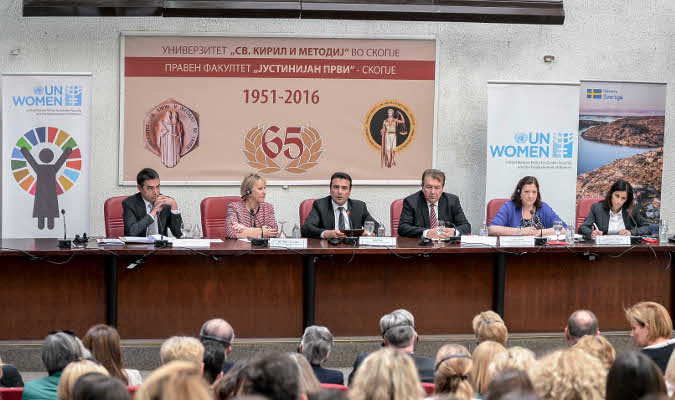
(Skopje, 9 October) – In a high-level event organized by UN Women, the Embassy of Sweden and hosted by the Faculty of Law “Iustinianus Primus” in Skopje, over 400 participants, including the Prime Minister and Minister of Foreign Affairs of the former Yugoslav Republic (FYR) of Macedonia, the Minister of Foreign Affairs of Sweden, other high-level government officials, women parliamentarians, academia, students, civil society representatives and independent experts, came together to discuss the opportunities and challenges in women’s leadership and political participation.
The event “Women’s Leadership and Political Participation - A Road to Equality” was organized in the frameworks of the UN Women initiative “Not Only on 8th of March,” which aims to emphasize that gender equality issues should not be in the limelight only once a year, but should be publicly debated throughout the year.
“Although the participation of women in the Parliament and local councils is 40%, women are underrepresented in the executive branch with only 4 women ministers out of 25. At the local level, there are only 4 women mayors out of 81. Only 6 per cent of mayor candidates are women in the upcoming local elections,” said Dominka Stojanoska, Head of UN Women Skopje office. She added that “advancing women’s participation in decision-making positions in the political life is one of the top priorities for UN Women in FYR Macedonia.”
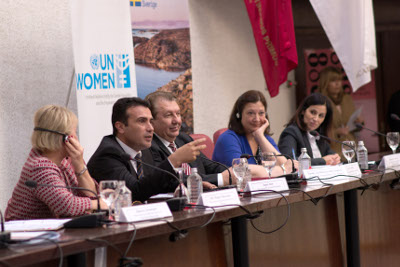
“To discuss women’s leadership in politics is both a privilege and a challenge,” said the Dean of the Faculty of Law, Prof. Dr. Goran Koevski, in his opening remarks and stressed that “women’s participation in decision and policy-making is a basic human right.”
“You have my support and the support of this government for achieving greater participation of women because gender equality is our responsibility,” said Zoran Zaev, the Prime Minister of FYR Macedonia and added that he considers himself “one of the greatest supporter of women’s equal participation in all sphere’s political life.”
Prime Minister Zaev informed the audience that a separate government body for gender equality, responsible for ensuring gender equality in policies and budgets, will be created.
Nikola Dimitrov, Minister for Foreign Affairs of FYR Macedonia commended the women “who showed courage to initiate change by protesting in the streets, with decisions brought by female judges, and the special prosecutors who are the symbol of responsibility in this country.”
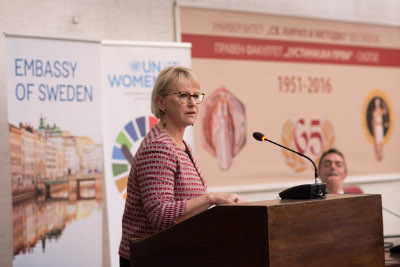
In her speech, Minister for Foreign Affairs of Sweden, Margot Wallström, tackled the key aspects of the Swedish feminist foreign policy: “Women should be given voice when decisions are made, when negotiations are being made, when peace agreements are being signed. Having more women at the table means more peace. This will mean more options on the table and longer-lasting peace.”
“I have decided not to see women as victims. Women are agents of change, and they want to play their role in the society,” said Ms. Wallström.
Ms. Wallström received the Agent of Change Award by UN Women in September for her commitment to advancing gender equality through the feminist foreign policy lens and her work to strengthen women’s rights.
Sweden is the first country in the world to pursue a feminist foreign policy, aiming to ensure that women and men are equal partners in shaping the society and their own lives. Ensuring that women and girls can enjoy their fundamental human rights is both an obligation within the framework of Sweden´s international commitments, and a prerequisite for reaching Sweden’s broader foreign policy goals on peace, security and sustainable development.
Mila Carovska, the Minister of Labor and Social Policy of FYR Macedonia, used the opportunity to also address the audience and noted two preconditions for achieving gender equality – gender-responsive budgets and fighting gender stereotypes, which will enable women to reach their full potential.
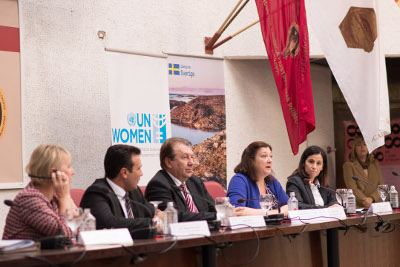
Alia El-Yassir, Regional Director a.i., UN Women Europe and Central Asia, noted that increasing women’s political participation is crucial for closing gender gaps and addressing gender stereotypes, and expressed UN Women’s support to the country to achieve equal participation of women and men across all levels of decision-making.
The first panel brought together six women Members of Parliament (MPs) and the President of the NGO Macedonian Women’s Lobby, Daniela Dimitrievska. The traditional and patriarchal values perpetuaded in families, the education system, the domestic, unpaid care work that women undertake at home, are some of the key issues that were raised by MP Maja Morachanin.
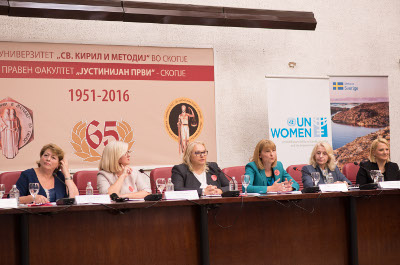
“We shouldn’t only pay attention to the number of women in politics. Women’s perspectives are crucial in decision-making processes and for the overall progress of the society,” said MP Mirsada Emini-Asani, talking about the challenges that women MPs face. “It’s hard to be a woman in politics, not only because of the tripple work women do at home, at their jobs and in the society, but also because women politicians experience violence, sexualization and hate speech in the public sphere,” noted Ms. Dimitrievska.
“I strongly encourage the young women students to actively engage in the political sphere. Your perspective is valuable and much needed,” said MP Gjulumser Kasapi, Coordinator of the Club of Women MPs.
The women parilamentarians were unanimous that quotas are very much needed. “Quotas are needed to ensure women’s participation in decision-making because we are still in a subordinate position,” said MP Sonja Mirakovska.
The event ended with screening of the Spanish movie “Ada for Mayor” (2016), which shows the electoral race of the current Mayor of Barcelona, Ada Colou, followed by a debate with students.